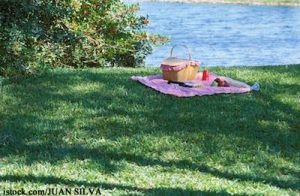It’s picnic time! The FDA has tips to make sure that your picnic is enjoyable. Taking food out of the kitchen has some inherent risks. But you can serve wholesome and delicious meals outdoors and keep picnic foods safe by following a few rules.
 If you are going to grill meat at a picnic or a camp site, make sure that the meat is defrosted before it hits the flames. Defrost meats in the refrigerator or by submerging sealed packages in cold water; never defrost meats on the counter. You can use the microwave to defrost meats, but only if they are going to be grilled immediately.
If you are going to grill meat at a picnic or a camp site, make sure that the meat is defrosted before it hits the flames. Defrost meats in the refrigerator or by submerging sealed packages in cold water; never defrost meats on the counter. You can use the microwave to defrost meats, but only if they are going to be grilled immediately.
Always marinate meats in the fridge too. And be sure to either boil that marinade or discard it after use; after it’s been in contact with raw meats, it is contaminated and can easily cross-contaminate other foods. If you don’t want to boil the marinade, reserve some in a separate container before it touches the raw meat, and serve after the food is cooked.
Wash all fruits and vegetables before preparing or eating, even those you are going to peel. If bacteria are on that produce, your knife can move them from the surface to the flesh when you peel and cut. And keep produce cold, so any bacteria counts are kept under control.
Picnic baskets demand special food safety rules. Put food directly into an insulated cooler from the fridge to make sure it stays cold. Use ice and ice packs to keep the food cold. Meats, poultry, and seafood should be packed into a separate cooler if possible. You can also put those foods in the bottom of the cooler where the temperature is coolest. Cold foods must stay cold. Think about packing beverages in a separate cooler so perishable foods aren’t put at risk because people are constantly opening the cooler to get cold drinks.
A food thermometer should be used to check the temperature of your cooler(s) to make sure it stays below 40 degrees F, and to make sure any meats you are grilling are cooked to a safe final temperature. For grilling tips, please see Grill, Baby Grill!
Perishable foods cannot be out of refrigeration longer than two hours, or just one hour if the air temperature is above 90 degrees F. If you’re eating for a longer time, serve perishable foods in batches, and discard foods that have been out of the cooler.
After your picnic, remember that an insulated cooler is not meant to chill foods, so any leftovers will not be cooled to a safe temperature. Leftover meats and other perishable foods such as hard cooked eggs or cheeses can’t be reused after a picnic.




